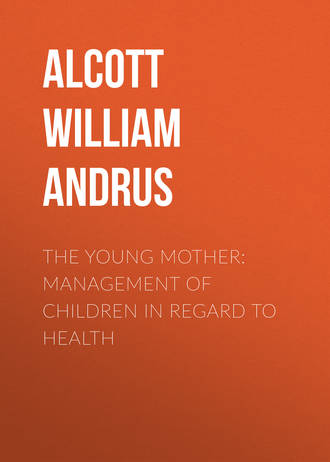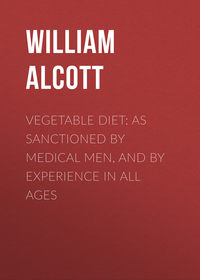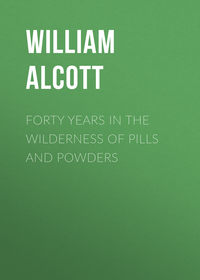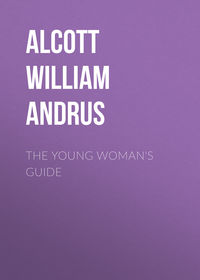
The Young Mother: Management of Children in Regard to Health
Now if nothing is wanting but a little training to render the touch so accurate, would it not be useful to train every child to judge frequently of the properties of bodies by this sense? And cannot every one recall to his mind a thousand situations in which a greater accuracy of this sense would have saved him much inconvenience, as well as afforded him no little pleasure?
I shall conclude this section with a few remarks on the HAND. The custom of neglecting, or almost neglecting the left hand, though nearly universal, in this country at least, appears to me to be wrong—decidedly so. For although more blood may be sent to the right arm than to the left, as physiologists say, yet the difference is not as great at birth as it is afterward; so that education either weakens the one or strengthens the other.
Besides this, we occasionally find a person who is left-handed, as it is called; that is, his left hand and arm are as much larger and stronger than the right, as the right is usually stronger than the left. How is this? Do we find a corresponding change in the internal structure? But suppose it could be ascertained that such a change did exist, which I believe has never been done, the question would still arise whether the difference was the same at birth, or whether the more frequent use of the left hand has not, in part, produced it.
I do not mean, here, to intimate that a more frequent use of the left hand than the right would make new blood-vessels grow where there were none before. But it would certainly do one thing; it would make the same vessels carry more blood than they did before, which is, in effect, nearly the same thing:—for the more blood in the limb, as a general rule, the more strength—provided the limb is in due health and exercise.
The inference which I wish the reader to make from all this is, that since the left hand and arm, by due cultivation, and without essential difference or change of structure to begin with, can occasionally be made stronger than the right, it is fair to conclude that it may, if found desirable, be always rendered more nearly equal to it than, in adult years, we usually find it.
The question is now fairly before us—Is such a result desirable? I maintain that it is; and shall endeavor to show my reasons.
How often is one hand injured by an accident, or rendered nearly useless by disease? But if it should be the right, how helpless it makes us! The man who is accustomed to shave himself, must now resort to a barber. If he is a barber himself, or almost any other mechanic, his business must be discontinued. Or if he is a clerk, he cannot use his left hand, and must consequently lose his time. Or if amputation chances to be performed on a favorite arm, how entirely useless to society we are, till we have learned to use the other! It not only takes up a great deal of valuable time to acquire a facility of using it, but if we are already arrived at maturity, we can never use it so well as the other, during our whole lives; because it is too late in life to increase its size and strength much by constant exercise. Whereas in youth, it might have been done easily.
Is it not then important—for these and many more reasons—to teach a child to use with nearly equal readiness, both of his hands? But if so, who can do it better than the mother? And when can it be better done than in the earliest infancy? When is the time which would be devoted to it worth less than at this period?
CHAPTER XX.
ABUSES
Bad seats for children at table and elsewhere. Why children hate Sunday. Seats at Sabbath school—at church—at district schools. Suspending children between the heavens and the earth. Cushions to sit on. Seats with backs. Children in factories. Evils produced. Bodily punishment. Striking the heads of children very injurious. Beating across the middle of the body. Anecdote of a teacher. Concluding advice to mothers.
It is difficult to determine, in regard to many things which concern the management of the young, whether they belong most properly to moral or physical education; so close is the connection between the two, and so decidedly does everything, or nearly everything which relates to the management of the body, have a bearing upon the formation of moral character. This work might be extended very much farther, did it comport with my original plan. But I hasten to close the volume, with a few thoughts on certain abuses of the body, which prevail to a greater or less extent in families and schools; and to which I have not adverted elsewhere.
The seats of children are usually bad, both at table and elsewhere. It seems not enough that we condemn them to the use of knives, forks, spoons, &c., of the same size with those of adults. We go farther; and give them chairs of the same height and proportion with our own. There are a few exceptions to the truth of this remark. Here and there we see a child's chair, it is true—but not often.
But how unreasonable is it to seat a child in a chair so high that his feet cannot reach the floor; and so constructed that there is no outer place on which the feet can rest. What adult would be willing to sit in so painful a posture, with his legs dangling? No wonder children dislike to sit much, in such circumstances. And it is a great blessing to both parent and child that they do. No wonder children hate the Sabbath, especially in those families where they are compelled to keep the day holy by sitting motionless! Sabbath schools, though they bring with them some evil along with a great deal of good, are a relief to the young in this particular—especially if their seats are more comfortable elsewhere than at home. They consider it much more tolerable to spend the morning and intermission of the day in going and returning from Sabbath school, than in constant and close confinement. They prefer variety, and the occasional light and air of heaven, to monotony and seclusion and silence.
It happens, however, that the seats at the Sabbath school and at church, are not always what they should be; nor, so far as church is concerned, do I see that this evil can be wholly avoided. Children usually sit with their parents, in the sanctuary—and they ought to do so: and the height of the seats cannot, of course, accommodate both. If there is a building erected solely for the use of the Sabbath school, the seats may be constructed accordingly, without seriously incommoding anybody; but in the church, I do not see, as I have once before observed, how the evil can be remedied.
The greatest trouble in regard to seats, however, is at the day school; especially in our district or common schools. There, it is usual for children to be confined six hours a day—and sometimes two in succession—to hard, narrow, plank seats, a large proportion of which are without backs, and raised so high that the feet of most of the pupils cannot possibly touch the floor. There, "suspended," as I have said in another work,23 "between the heavens and the earth, they are compelled to remain motionless for an hour or an hour and a half together."
I have also shown, in the same essay, that in regard to the desks, and indeed many other things which pertain to, or are connected with the school, very little pains is taken to provide for the physical welfare or even comfort of the pupils; and that a thorough reform on the subject appears to be indispensable.
When I speak of hard plank seats, let me not be understood as hinting at the necessity of cushions. When I wrote the essay above mentioned, I did indeed believe that they were desirable. But I am now opposed to their use, either by children or adults, even where a laborious employment would seem to demand a long confinement to this awkward and unnatural position. If our seats are cushioned, we shall sit too easily. I believe that our health requires a hard seat; because its very hardness inclines us to change, frequently, our position.
But if we must sit, be it ever so short a time, our seats should always have backs; and those which are designed for children, should not be so high as to render them uncomfortable. Nor should the backs of seats be so high as they usually are, either for children or adults. They should never come much higher than the middle of the body. If they reach the shoulders, they either favor a crouching forward, or interfere with the free action of the lungs.
This might be deemed a proper place for saying something on the position of children in manufactories. But here a world of abuse opens upon my view, the full development of which demands a large volume. How many crooked spines, emaciated bodies, decaying lungs, as well as scrofulas, fevers, and consumptions, are either induced or accelerated by these unnatural employments! I mean they are unnatural for the young. As to employing adults in them, I have nothing at present to say. But when I think of the cruel custom of placing children in these places, whose bodies—and were this the place, I might add, minds—are immature, and especially girls, I am compelled, by the voice of conscience, and, as I trust, by a regard to those laws which God has established in our physical frames, but which are yet so strangely violated, to protest against it. Better that no factories should exist, than that children should be ruined in them as they now are. Better by far that we should return, were it possible, to the primitive habits of New England—to those by-gone days when mothers and daughters made the wearing apparel of themselves and their families—when, if there was less of intellectual cultivation, and less money expended for luxuries and extravagances, there was much more of health and happiness.
There is one more species of abuse to which, in closing, I wish to direct maternal attention. I allude to injudicious modes of inflicting corporal punishment.
Let me not be understood to appear, in this place, as the advocate of bodily punishments of any kind; for if they are even admissible under some circumstances, I am fully convinced that in the way in which they are commonly administered, they do much more harm than good.
But leaving the question of their utility, in the abstract, wholly untouched, and taking it for granted, for the present, that they are—as is undoubtedly the fact—sometimes employed, and will continue to be so for a great while to come, I proceed to speak of their more flagrant abuses.
Among these, none are more reprehensible than blows of any kind on the head. Even the rod is objectionable for this purpose, since it exposes the eyes. But the hand—in boxing the ears or striking in any way—is more so. The bones of the head, in young children, are not yet firmly knit together, and these concussions may injure the tender brain. I know of whole families, whose mental faculties are dull, as the consequence—I believe—of a perpetual boxing and striking of the head. Some individuals are made almost idiots, in this very manner.—But the worst is not yet told. Many teachers are in the habit of striking their pupils' heads with thick heavy books; and with wooden rules. I have seen one of the latter, of considerable size and thickness, broken in two across the head of a very small boy; and this, too—such is the public mind—in the presence of a mother who was paying a visit to the school. I have seen parents and masters strike the heads of their children with pieces of wood, of much larger size;—in one instance with a common sized tailor's press-board; in another with the heavy end of a wooden whip-handle, about an inch in diameter.
Children are sometimes severely beaten across the middle of the body—the region where lie the vital organs—the lungs, the heart, the liver, &c. They are sometimes beaten too, across the joints, or in any place that the excited, perhaps passionate teacher or parent can reach. Rules and books are thrown with violence at pupils in school. There is a story in the "Annals of Education," Vol. IV. at page 28, of a teacher who threw a rule at a little boy, six years old, which struck him with great force, within an inch of one of his eyes. Had it struck a little nearer to his nose, it would, in all probability, have destroyed his left eye.
But without extending these remarks any farther, every intelligent mother who reads what I have already written, will see, as I trust, the necessity of properly informing herself on the great subject of physical education; and of being better prepared than she has hitherto been for acquitting herself, with satisfaction, of those high and sacred responsibilities which, in the wise arrangements of Nature and Providence, devolve upon her.
1
Oxygen gas is the chief supporter of combustion, as well as of respiration. It is the vital part, as it were, of the air. No animal or vegetable could long exist without it. And yet if alone, unmixed, it is too pure and too refined for animals to breathe. Nitrogen gas, on the contrary, while alone, will not support either respiration or combustion; mixed, however, with oxygen, it dilutes it, and in the most happy manner fits it for reception into the lungs.
2
I say, from early infancy; because we may adopt the best habits in mature years, after our constitutions have been broken up by error and vice, without effecting anything more than to keep us from actually sinking at once. Indeed, in most cases we ought not to expect more.
3
Nothing is intended to be said here, which shall encourage unthinking nurses or mothers in setting themselves against measures which have been prescribed by higher authority,—I mean the physician. There are cases of this kind, where it requires all the resolution which a father, uninterrupted, can summon to his aid, to administer a dose or perform a task, on which he knows the existence of his child may be depending: but when the thoughtless entreaties of the mother or nurse are interposed, it makes his condition most distressing. Mothers, in such cases, ought to encourage rather than remonstrate. They who do not, are guilty of cruelty, and—perhaps—of infanticide.
4
"Dewees on children" p. 72.
5
Let me not be understood as intimating that, the general neglect of bathing, of which I complain so loudly, is chiefly owing to this unreasonable prejudice, though this no doubt has its sway. On the contrary, I believe it is much oftener owing to ignorance, indolence, and parsimony.
6
Those of Connecticut and New Hampshire.
7
About 40,000 a year, in the United States, as nearly as it can be estimated.
8
Elements of Hygiene, page 271.
9
Though Dr. C.'s remarks will apply more closely to England in 1750, they are by no means inapplicable to the United States in 1837.
10
That which we commonly observe in them, in such cases, and call by the name of hunger, the Doctor, I suppose would regard as morbid or unnatural feeling, wholly unworthy of the name of HUNGER.
11
Some considerable savage nations use no salt, and a few have a strong aversion to it.
12
I ought to remark, that as the morning is the best time for eating good fruit, so it is the very worst time for eating it if not good; and as a large proportion of that which is eaten is unripe, or otherwise bad, this may account for the general prejudice against eating it at this period.
13
It is to be remembered that those who eat confectionary so slightly poisoned that it does not make them sick at once, may nevertheless be as much injured in their constitutions as they who are poisoned outright. In the latter case, the poison is in part thrown out of the body; in the former, it remains in it much longer—and therefore more surely, though more slowly, accomplishes the work of destruction.
14
Such a volume is in preparation. It is intended as a companion to the present.
15
Buchan's "Advice to Mothers," pages 337, 388
16
Advice to Mothers, page 338
17
The art of standing, which consists in balancing one's self, by means of the muscles of the body and lower limb—simple as it may seem to those who have never reflected on the subject—is really an important acquisition for a child of twelve or fifteen months. No wonder they feel a conscious pride, when they find themselves able to stand erect, like the world around them.
18
I will even say, more distinctly than I have already done, that however popular the contrary opinion may be, neither study nor work ought to be regarded as mere amusement. I would, it is true, take every possible pains to render both work and study agreeable; but I would at the same time have it distinctly understood, that one of them is by no means the other; that, on the contrary, work is work—study, study—and amusement, amusement.
19
See his Lecture before the American Institute of Instruction
20
There may be instances where the debility of an infant will be so great that the mother or a nurse must sleep with it, to keep it warm. But such cases of disease are very rare.
21
This absurd custom is a fruitful source of that distressing condition of the hands and feet, in winter, called "chilblains."
22
If this principle be correct, what is the tendency of our numerous schools, which are exclusively for one sex? Must there not be latent evil to counterbalance some of the seeming good? For myself, I doubt whether moral character can ever be formed in due proportion and harmony, where this separation long exists.
23
See a "Prize Essay," on School Houses, page 7.





